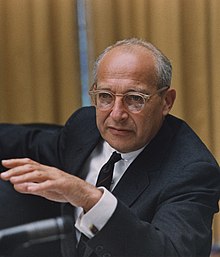Walt Rostow | |
|---|---|
 Rostow in 1968 | |
| 6th United States National Security Advisor | |
| In office April 1, 1966 – January 20, 1969 | |
| President | Lyndon B. Johnson |
| Deputy | Francis Bator |
| Preceded by | Mac Bundy |
| Succeeded by | Henry Kissinger |
| 14th Counselor of the United States Department of State | |
| In office December 4, 1961 – March 31, 1966 | |
| President | John F. Kennedy Lyndon Johnson |
| Preceded by | George McGhee |
| Succeeded by | Robert Bowie |
| 6th Director of Policy Planning | |
| In office December 4, 1961 – March 31, 1966 | |
| President | John F. Kennedy Lyndon Johnson |
| Preceded by | George McGhee |
| Succeeded by | Henry Owen |
| 1st Deputy National Security Advisor | |
| In office January 20, 1961 – December 4, 1961 | |
| President | John F. Kennedy |
| Preceded by | Position established |
| Succeeded by | Carl Kaysen |
| Personal details | |
| Born | Walt Whitman Rostow October 7, 1916 New York City, U.S. |
| Died | February 13, 2003 (aged 86) Austin, Texas, U.S. |
| Political party | Democratic |
| Spouse | Elspeth Davies |
| Children | 2 |
| Education | Yale University (BA, MA, PhD) Balliol College, Oxford (BLitt) |
Walt Whitman Rostow OBE (rahs-TOU; October 7, 1916 – February 13, 2003) was an American economist, professor and political theorist who served as national security advisor to president of the United States Lyndon B. Johnson from 1966 to 1969.[1][2]
Rostow worked in the Office of Strategic Services during World War II and later was a foreign policy adviser and speechwriter for presidential candidate and then President John F. Kennedy; he is often credited with writing Kennedy's famous "New Frontier" speech.[3] Prominent for his role in shaping US foreign policy in Southeast Asia during the 1960s, he was a staunch anti-communist, noted for a belief in the efficacy of capitalism and free enterprise, and strongly supported US involvement in the Vietnam War. Rostow is known for his book The Stages of Economic Growth: A Non-Communist Manifesto (1960), which was used in several fields of social science. Rostow's theories were embraced by many officials in both the Kennedy and Johnson administrations as a possible counter to the increasing popularity of communism in Asia, Africa and Latin America.
His elder brother Eugene Rostow also held a number of high government foreign policy posts.
- ^ "The Cold Warrior Who Never Apologized". New York Times. September 8, 2017.
- ^ "Voice of U.S. Policy. Walt Whitman Rostow". New York Times. April 13, 1967.
- ^ "Walt Rostow". The Telegraph. 2003-02-24. Retrieved 2023-11-30.